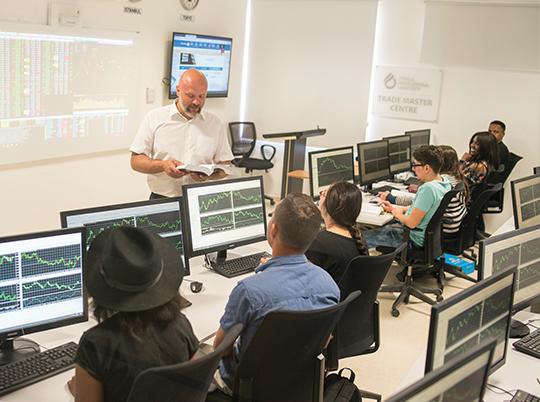


About the Department
A bachelor’s degree in Accounting and Finance provides theoretical, conceptual, technical, and practical knowledge in managing the financial functions in every organization: financial or non-financial, private or public, large or small, profit-seeking or non-profit. This degree is extremely specialized: the curriculum requires sufficient study time for professional practice in financial accounting, intermediate accounting, cost accounting, management accounting, international financial reporting standards, auditing, financial management, financial markets and institutions, investments, financial statement analysis, international finance and corporate finance. The curriculum also includes intermediate level coursework in business law, international law and economics and general coverage of management theory along with business mathematics and statistics. Practical classes will equip students with the knowledge and skills that will be needed in real-life business, such as analyzing and auditing the financial statements of companies.
Accreditations
Accounting and Finance Program was accredited by the Foundation for International Business Administration Accreditation (FIBAA) on 17th September 2018, due to progressing with the same standards and parallel to the world, and continues to provide education in accordance with the accreditation standards.
Education Opportunities
The program not only focuses on the theories of accounting and finance, but also helps students to deepen their understanding of the inner workings of the accounting and finance sector in the real world. Department staff see the necessity of improving and introducing modern teaching techniques such as term projects and practical application of knowledge and skills, providing opportunities for students to follow the latest developments in the worldwide capital market. The program will prepare students in the best way for the accounting and finance world, by providing them with the most recent theoretical information and empirical applications. Finance lab will help students become competitive and contribute to their employability in both national and international job markets. Upon graduation, students will be obtained the special skills to be experts in investment and portfolio management.

Career Areas
Upon completion of the Bachelor of Accounting and Finance program, students will have excellent job opportunities in the accounting and finance sectors, such as accounting and financial consultancy companies, independent auditing institutions, banks, finance companies, stock exchange intermediaries and brokerage houses, public finance institutions and accounting and finance departments of business enterprises. Graduates will also have a chance to work as Certified Public Accountants and/or Certified Financial Officers, auditors, consultants or lecturers. On the other hand, program also prepares the students to excel academically and pursue an academic career by completing a master’s program.
Contact
Faculty of Economics and Administrative Sciences
Education and Graduate Sciences Center, GE 203
Tel: +90 392 671 1111 Extension: 2201
Faculty E-mail: secretary-fes@ciu.edu.tr
Head of Department: Assoc. Prof. Dr. Kemal ÇEK
Head of Department E-mail: kcek@ciu.edu.tr
Compulsory Courses
First Semester
INTRODUCTION TO BUSINESS-I
Course code
BUSN101Credit
3Theoretical
3Practical
0Ects
6MICROECONOMICS
Course code
ECON101Credit
3Theoretical
3Practical
0Ects
6READING AND WRITING SKILLS-I
Course code
ENGL141Credit
3Theoretical
2Practical
2Ects
4INFORMATION TECHNOLOGY
Course code
ITEC101Credit
3Theoretical
2Practical
2Ects
6MATHEMATICS FOR BUSINESS AND ECONOMICS-I
Course code
MATH111Credit
3Theoretical
3Practical
0Ects
6TURKISH LANGUAGE
Course code
TREG100Credit
0Theoretical
2Practical
0Ects
2TURKISH
Course code
TURK100Credit
0Theoretical
2Practical
0Ects
2Second Semester
MACROECONOMICS
Course code
ECON102Credit
3Theoretical
3Practical
0Ects
6READING AND WRITING SKILLS-II
Course code
ENGL142Credit
3Theoretical
2Practical
2Ects
4HISTORY OF CIVILIZATION
Course code
HIST100Credit
0Theoretical
2Practical
0Ects
2INFORMATION TECHNOLOGY II
Course code
ITEC102Credit
3Theoretical
2Practical
2Ects
6MATHEMATICS FOR BUSINESS AND ECONOMICS-II
Course code
MATH112Credit
3Theoretical
3Practical
0Ects
6PSYCHOLOGY
Course code
PSYC110Credit
3Theoretical
3Practical
0Ects
6MODERN TURKISH HISTORY
Course code
TARH100Credit
0Theoretical
2Practical
0Ects
2Third Semester
ACCOUNTING-I
Course code
ACFN211Credit
3Theoretical
3Practical
0Ects
7COST ACCOUNTING-I
Course code
ACFN361Credit
3Theoretical
3Practical
0Ects
6ETHICS & SOCIAL RESPONSIBILITY
Course code
EASC220Credit
3Theoretical
3Practical
0Ects
6BUSINESS FINANCE
Course code
EASC345Credit
3Theoretical
3Practical
0Ects
6STATISTICS-I
Course code
STAT205Credit
3Theoretical
3Practical
0Ects
5Fourth Semester
ACCOUNTING-II
Course code
ACFN212Credit
3Theoretical
3Practical
0Ects
7MARKETING
Course code
EASC331Credit
3Theoretical
3Practical
0Ects
6FINANCIAL MANAGEMENT
Course code
EASC346Credit
3Theoretical
3Practical
0Ects
6INTRODUCTION TO POLITICAL SCIENCE
Course code
INRE101Credit
3Theoretical
3Practical
3Ects
6STATISTICS-II
Course code
STAT206Credit
3Theoretical
3Practical
0Ects
5Fifth Semester
INTERMEDIATE ACCOUNTING-I
Course code
ACFN346Credit
3Theoretical
3Practical
0Ects
6AREA ELECTIVE
Course code
ACFNXX1Credit
3Theoretical
3Practical
0Ects
6AREA ELECTIVE
Course code
ACFNXX2Credit
3Theoretical
3Practical
0Ects
6INVESTMENTS
Course code
EASC465Credit
3Theoretical
3Practical
0Ects
6ECONOMETRICS
Course code
ECON304Credit
3Theoretical
3Practical
0Ects
6Sixth Semester
FINANCIAL MARKETS AND INSTITUTIONS
Course code
ACFN310Credit
3Theoretical
3Practical
0Ects
6FINANCIAL STATEMENT ANAYSIS
Course code
ACFN400Credit
3Theoretical
3Practical
0Ects
6AREA ELECTIVE
Course code
ACFNXX3Credit
3Theoretical
3Practical
0Ects
6AREA ELECTIVE 4
Course code
ACFNXX4Credit
3Theoretical
3Practical
0Ects
6INTERNATIONAL BUSINESS LAW
Course code
BUSN201Credit
3Theoretical
3Practical
0Ects
6Seventh Semester
AUDITING-I
Course code
ACFN421Credit
3Theoretical
3Practical
0Ects
6INTERNATIONAL FINANCE
Course code
ACFN460Credit
3Theoretical
3Practical
0Ects
6ELECTIVE
Course code
ACFNXX5Credit
3Theoretical
3Practical
0Ects
6FREE ELECTIVE
Course code
FREEXX1Credit
3Theoretical
3Practical
0Ects
6UNIVERSITY ELECTIVE
Course code
UNIEXX1Credit
3Theoretical
3Practical
0Ects
6Eighth Semester
ACCOUNTING AND FINANCE CAPSTONE PROJECT
Course code
ACFN402Credit
3Theoretical
3Practical
0Ects
6CORPORATE FINANCE
Course code
ACFN484Credit
3Theoretical
3Practical
0Ects
6ELECTIVE
Course code
ACFNXX6Credit
3Theoretical
3Practical
0Ects
6FREE ELECTIVE
Course code
FREEXX2Credit
3Theoretical
3Practical
0Ects
6UNIVERSITY ELECTIVE
Course code
UNIEXX2Credit
3Theoretical
3Practical
0Ects
6Elective Courses
MANAGERIAL ACCOUNTING
Course code
ACFN482Credit
3Theoretical
3Practical
0Ects
6MANAGERIAL ACCOUNTING
Course code
BUSN302Credit
3Theoretical
3Practical
0Ects
6INTERNATIONAL ECONOMICS
Course code
ACFN423Credit
3Theoretical
3Practical
0Ects
6COMPUTER APPLICATIONS FOR FINANCE
Course code
ACFN351Credit
3Theoretical
3Practical
0Ects
6CREATIVITY AND INNOVATION
Course code
BUSN236Credit
3Theoretical
3Practical
0Ects
6INTERNATIONAL FINANCIAL REPORTING STANDARDS
Course code
ACFN345Credit
3Theoretical
3Practical
0Ects
6INTERNATIONAL BUSINESS MANAGEMENT
Course code
BUSN471Credit
3Theoretical
3Practical
0Ects
MONEY AND BANKING
Course code
BUSN332Credit
3Theoretical
3Practical
0Ects
6MANAGERIAL ECONOMICS
Course code
ECON465Credit
3Theoretical
3Practical
0Ects
6MANAGING SOCIAL RESPONSIBILITY PROJECTS
Course code
BUSN437Credit
3Theoretical
3Practical
0Ects
6ORGANIZATIONAL BEHAVIOUR
Course code
BUSN207Credit
3Theoretical
3Practical
0Ects
6STATISTICAL APPLICATIONS FOR SOCIAL SCIENCES
Course code
STAT461Credit
3Theoretical
3Practical
0Ects
5KNOWLEDGE MANAGEMENT
Course code
BUSN410Credit
3Theoretical
3Practical
0Ects
6MARKETING OF FINANCIAL SERVICES
Course code
ACFN401Credit
3Theoretical
3Practical
0Ects
SMALL BUSINESS MANAGEMENT
Course code
BUSN416Credit
3Theoretical
3Practical
0Ects
6INTERPERSONAL COMMUNICATION
Course code
BUSN209Credit
3Theoretical
3Practical
0Ects
6MARKETING MANAGEMENT
Course code
MRKT116Credit
3Theoretical
3Practical
0Ects
7MONEY AND BANKING
Course code
ECON332Credit
3Theoretical
3Practical
0Ects
7INTERNATIONAL MARKETING
Course code
BUSN484Credit
3Theoretical
3Practical
0Ects
6FUNDAMENTALS OF ECONOMICS
Course code
ECON110Credit
3Theoretical
3Practical
0Ects
5PROJECT MANAGEMENT
Course code
BUSN441Credit
3Theoretical
3Practical
0Ects
6POLITICS IN BALKANS
Course code
INRE440Credit
3Theoretical
0Practical
0Ects
6INTERNATIONAL ECONOMICS
Course code
BUSN423Credit
3Theoretical
3Practical
0Ects
5US FOREIGN POLICY
Course code
INRE422Credit
3Theoretical
3Practical
3Ects
6CONSUMER BEHAVIOR
Course code
MRKT217Credit
3Theoretical
3Practical
0Ects
6INTERNATIONAL ACCOUNTING
Course code
ACFN453Credit
3Theoretical
3Practical
0Ects
6INTRODUCTION TO DIGITAL MARKETING
Course code
DMMA102Credit
3Theoretical
3Practical
0Ects
7INTERNATIONAL ECONOMICS II
Course code
ECON354Credit
3Theoretical
3Practical
0Ects
6CRITICAL SECURITY STUDIES
Course code
INRE428Credit
3Theoretical
3Practical
3Ects
6POLITICS OF CYPRUS
Course code
INRE419Credit
3Theoretical
3Practical
3Ects
MANAGEMENT SCIENCE
Course code
BUSN321Credit
3Theoretical
3Practical
0Ects
6ORGANIZATION THEORY
Course code
BUSN361Credit
3Theoretical
3Practical
0Ects
HUMAN RIGHTS
Course code
INRE431Credit
3Theoretical
3Practical
3Ects
6ISSUES IN INTERNATIONAL RELATIONS
Course code
INRE446Credit
3Theoretical
3Practical
3Ects
6POLITICS IN CENTRAL ASIA AND CAUCASUS
Course code
INRE421Credit
3Theoretical
3Practical
3Ects
6ISSUES IN GLOBALIZATION
Course code
INRE412Credit
3Theoretical
3Practical
3Ects
6E-COMMERCE
Course code
BUSN428Credit
3Theoretical
3Practical
0Ects
INTRODUCTION TO PUBLIC RELATIONS
Course code
DMMA203Credit
3Theoretical
3Practical
0Ects
6FISCAL POLICY AND PUBLIC FINANCE
Course code
ECON312Credit
3Theoretical
3Practical
0Ects
6TURKISH FOREIGN POLICY
Course code
INRE444Credit
3Theoretical
3Practical
0Ects
6INTRODUCTION TO WORLD POLITICS
Course code
INRE104Credit
3Theoretical
3Practical
3Ects
6EU SOCIAL POLICY
Course code
INR442Credit
3Theoretical
3Practical
0Ects
6COST ACCOUNTING
Course code
EASC327Credit
3Theoretical
3Practical
0Ects
7INTERNATIONAL ECONOMICS-I
Course code
ECON353Credit
3Theoretical
3Practical
0Ects
6MEDIA AND INTERNATIONAL CONFLICT
Course code
INRE456Credit
3Theoretical
3Practical
3Ects
6ACCOUNTING-II
Course code
BUSN212Credit
3Theoretical
3Practical
0Ects
7CURRENT WORLD EVENTS
Course code
INR418Credit
3Theoretical
3Practical
0Ects
BRAND MANAGEMENT
Course code
DMMA305Credit
3Theoretical
3Practical
0Ects
5ECONOMETRICS
Course code
ECON304Credit
3Theoretical
3Practical
0Ects
6TRNC citizens and TR citizen candidate students who have completed their entire high school education in TRNC. They are placed in undergraduate programs in line with their success in the CIU Student Placement and Scholarship Ranking Exam and the programs they prefer.
Students who are successful in the exam can register from the TRNC Marketing Office.
Applicants can directly apply online to our undergraduate programs by using the application portal. Please fill in your details correctly and upload all the required documents listed on the last page of the application form.
Required documents;
- Completed application form,
- Higher/Secondary Certificate or equivalents (e.g. O/A’Level, WAEC/NECO)
- Evidence of English Language competence: TOEFL (65 IBT) or IELTS (5.5). Students without these documents will take the CIU English proficiency exam on campus following arrival,
- Scanned copy of international passport/birth certificate,
- Fully completed and signed CIU Rules and Regulations document (which can be downloaded during the online application).
Cyprus International University provides academic scholarships for its students as an incentive for success, with most students benefiting from 50%, 75% or 100% scholarships or discounted tuition fees. Click for more information.
Tuition Fees are determined at the beginning of each academic year. Candidate students who are entitled to enroll in CIU can learn their fees in line with the Tuition Fee Calculation system.